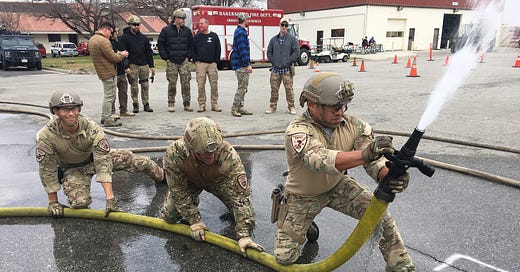I have been thinking about the concept of obedience and its relationship to virtue. In the Marine Corps, and also in many police departments, the training begins with instilling discipline and the ability to instantly and willingly carry out orders. The instructor gives a command, and the recruits carry it out with as much speed and intensity as they can muster. If the instructor senses the recruits are holding back any effort at all, there will be punishment and then they will start over. This creates discipline, respect for authority and chain of command, and an ability to act out the organization or unit’s intent without hesitation. All of these are virtues when the organization is functioning properly and oriented towards truth and the good. But what about when the organization starts to slide and become corrupted? When it is no longer oriented towards truth or the good, when it is hijacked by bad actors or totalitarians then obedience becomes a tool of oppression and evil.
The flip side of obedience, random and impulsive disobedience is not a virtue either. Breaking rules and violating norms just for the thrill is destructive and causes chaos and disorder. That’s essentially what it means to be a criminal, someone who disregards the law and social norms in exchange for their own short-term hedonistic interests. This is the person who steals when then they want something, becomes violent at the smallest provocation, and has no loyalty in their relationships. They are only interested in their most base impulsive desires and are inhibited only by what they think they cannot get away with. They view the world through a selfish cost benefit analysis and are willing to risk punishment and social scorn for personal gain. While this behavior is corrosive and destructive, these individuals do have a trait that most rule followers lack-a willingness to break the rules. While I’m not advocating for breaking the law or violating norms, it does take a level of courage to recognize the potential for punishment and to act out anyway.
Much of what we recognize as good behavior is just cowardice. We follow the rules, even the obviously absurd rules, because we don’t want to face the consequences for not following them. This is how you get an entire population to stay in their houses for months on end. When a guy in a white lab coat or a talking head on the television says you must wear a piece of paper on your face or you’re a bad person, the instinct is to put the paper on your face. It feels ridiculous and you know its not making anything better but you do it because you want the world to know you’re a good person who follows the rules. When a virus breaks out and less than a year later Big Pharma produces a “vaccine” that is “safe and effective,” we don’t ask how they know its safe without any long-term studies or testing. We take the shot. After all, we are good people who don’t want to kill grandma.
The proper mode of being, at least as I see it, is a well-balanced approach to following rules, but being willing to break the rules when necessary. We all instinctively recognize this. This is why the best protagonist is always the good guy with an edge. The bad guy who gets converted over to the good side and works on behalf of the people while still keeping a part of his dark side. Disobeying COVID restrictions doesn’t automatically make you Batman or Deadpool, but it is a start. The proper mode of being is to follow the rules as your default approach, but to reserve the right to be radically disobedient when necessary. You should wait in line, stop at the red lights, enter and exit through the correctly labeled doors, but also be willing to ask “why?” when something doesn’t make sense. If the answer is “because that’s the way we’ve always done it,” or if the person in charge gets mad at you for asking, you should probably start paying attention.
When society, or boot camp, teaches us to follow the rules, this is not virtue. It is the beginning of virtue. We should learn how to follow the rules and then be ready to question the rules when they don’t make sense. Some of my biggest regrets have come from times when I went along with something I knew was wrong. When I followed the rules or directives not because they were right, but because I was afraid of what would happen to me if I disobeyed. When I payed attention in these situations I could feel myself becoming weak and small. The antidote to being weak and small is to tell the truth even, and especially, when there are negative consequences for doing so. You should have faith that the outcome for telling the truth will be good even if it seems to negatively impact you in the moment.





Outstanding piece brother!!!!!
Henry David Thoreau talked about civil disobedience. Maybe you could take a gander.